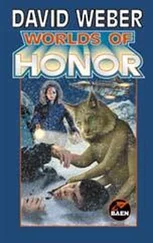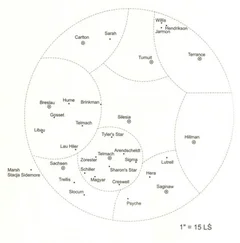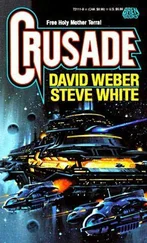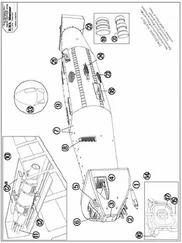McBryde's eyebrows went up. Luff's top recruiting agent didn't handle run-of-the-mill hiring. Still, he couldn't recall any instance where Inez Cloutier had allowed a prospective contractor to dicker for more than a couple of days. Admittedly, Jack hadn't tried to keep entirely on top of that situation.
"In short," Lajos concluded, "one of them is definitely from outside the system and the other—the waiter, that is—could very well be. And regardless of their origins, I can't think of any legitimate reason either one of them would have any contact with Hansen's group. I'm thinking one or both is likely to be a Ballroom agent. Pulling them in and breaking them could give us an additional peek inside the Ballroom's plans where Mesa is concerned."
"Not all that likely, though," McBryde observed, and Irvine grunted in sour agreement.
They might have kept Ballroom agents from establishing any significant presence here on the planet, but Ballroom operatives seldom provided anything useful in the way of information, either. Partly because the Ballroom understood operational security at least as well as anyone else in the galaxy. It compartmentalized information tightly, and it applied the "need-to-know" rule ruthlessly. More than that, any of its operatives who possessed truly sensitive knowledge were also provided with the means for reliable self-termination. More than one of them had chosen surgically implanted explosive devices, which had taken their share of security personnel with them over the years.
"I didn't say it was likely," Irvine said. "I only said it could give us some extra information."
"Have you managed to pick up anything else about them? Anything more than just the fact that we don't know who they are, I mean?"
"Not a damned thing," Irvine admitted frankly. "I did get a few images of them, though. These are from the one and only time I ever spotted the two of them together in the same place. The StateSec guy seems to be having breakfast in the same restaurant the waiter works. Here."
He reached into the neck of his smock and flipped across a chip folio. McBryde caught it, extracted the single chip inside it, and inserted it into his desk computer. It took a moment for the computer's internal security systems to decide the data on the chip was acceptable, and then a holo image of two men appeared above his desk.
He gazed at them curiously. Whatever the StateSec man's purpose might be, if Irvine's suspicion that the other one also came from outside the Mesa System had any validity, then the waiter wasn't a seccy at all, even though he was working for one. McBryde had always wondered what went on inside the heads of escaped genetic slaves who voluntarily walked straight back into the lion's den. Unlike some of his fellows, he'd always respected their courage, and of late he'd begun to understand the kind of personal outrage which motivated many of them far better than he'd ever understood it before. Still—
His thoughts slithered to a halt. Somehow—he never knew how—he managed to keep his eyes from widening or his jaw dropping, but it was hard.
It can't be , his brain insisted quietly. Not here. Not even those two would be ballsy enough!
Yet even as his brain insisted, he knew better. The one sitting at a table was a thoroughly unremarkable-looking, almost slightly built young fellow. If Jack hadn't been told he was a Havenite, he would have assumed that the man was descended from any of several general laborer lines. But the other . . . At a glance, you might assume the other was obviously descended from a heavy labor line. But Jack knew Irvine was right. This was no line ever developed by Manpower. The guy was simply much too short for that incredible physique. When Manpower developed a line specifically for muscular power, they made them big all around. It would have been foolish not to do so, as a practical matter, and probably even genetically difficult.
McBryde studied the images, concentrating on the waiter. The facial features were different, but that could be done any number of ways. The things that were much harder to disguise . . . The coloring, that massive neck, that tilt of the head, those incredibly broad shoulders, like some dwarven mountain king—or troll . . . those McBryde recognized. Recognized because he'd seen them so recently, in a broad-distribution, priority memo, and he wondered how Irvine could possibly not have recognized them.
Because he never got the memo , he realized almost instantly. He's at too low a level, and it never would have occurred to anyone to look right here, on Mesa itself. The only reason Steve and I ever saw the memo was that it was distributed to everyone above Level Twelve, and Lajos isn't routinely cleared for anything above Level Three unless it's specifically related to his current assignment .
"Well," he said out loud, " I don't recognize them." He chuckled. "On the other hand, I don't suppose they'd send anyone they expect us to be able to pick out of a lineup, now would they?"
McBryde killed the images. "I'll pass it around, Lajos, but don't get your hopes up." It was his turn to shrug. "I don't imagine we're going to get a direct hit on the imagery, even assuming these two were stupid enough to come in without at least trying to disguise themselves. And, frankly, I'm inclined to doubt that anyone higher up the chain is going to authorize taking out the entire group, either. In fact, if they are in contact with the Ballroom, the decision's probably going to be that that very fact makes keeping an eye on them and seeing what they do even more important."
"I know." Irvine sighed. "I can hope, though."
"Oh, we can always hope," McBryde agreed. "We can always hope."
It's been too damned long since you were operational , Jack McBryde told himself nervously. And you were never as good at this sort of thing as Steve is, anyway .
The thought was unfortunately accurate, but there wasn't a lot he could do about it. Except, of course, to forget the entire insane idea and hand his suspicions over to Isabel Bardasano the way he was damned well supposed to.
But that wasn't going to happen. If it had been, he wouldn't be sitting here in a back corner of a so-called eatery of the sort which was still known as "a greasy spoon," nursing a spectacularly bad cup of coffee and watching flies buzz through the overhead clouds of sleep-weed smoke. That smoke was so thick he was frankly amazed the flies didn't simply nose dive out of it and smack into the tabletop in a drugged stupor.
He grimaced at the thought, but there was some truth to it. Enough, in fact, that he'd been careful to inhale the nanotech busy scavenging the stuff out of his own bloodstream as quickly as it got there. Sleep weed, also known as "old sleepy" and just plain "weed," was one of the Mesan slave labor force's intoxicants of choice. It was more addictive than alcohol (for most people, at least), yet it was also less expensive, and it didn't produce a hangover. With persistent use (and most of its users smoked it very heavily), it did produce some nasty respiratory problems, but that usually took several decades. Given the fact that very few genetic slaves lived much more than five or six decades, total, it was scarcely a pressing concern for the slaves who smoked it.
McBryde took another sip of tepid coffee, then followed that with another bite from the sugarcoated doughnut he'd ordered to go with it. About the only thing he could say for the doughnut was that it was better than the coffee and probably not actively poisonous. Or not, at least, sufficiently poisonous to pose a threat to an alpha's enhanced physiology.
Читать дальше












